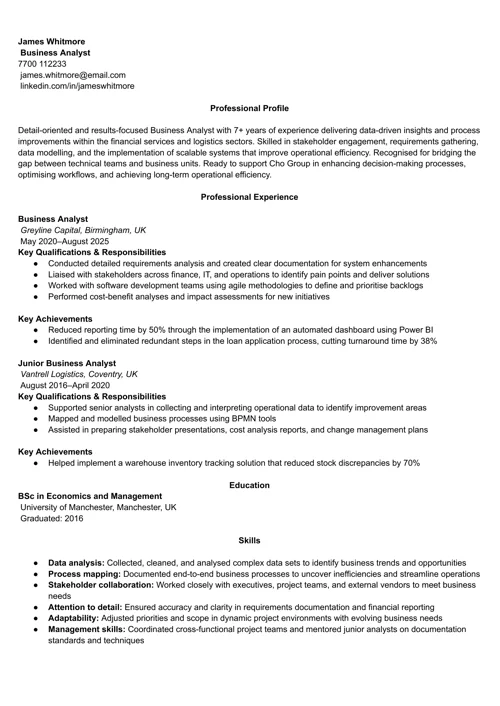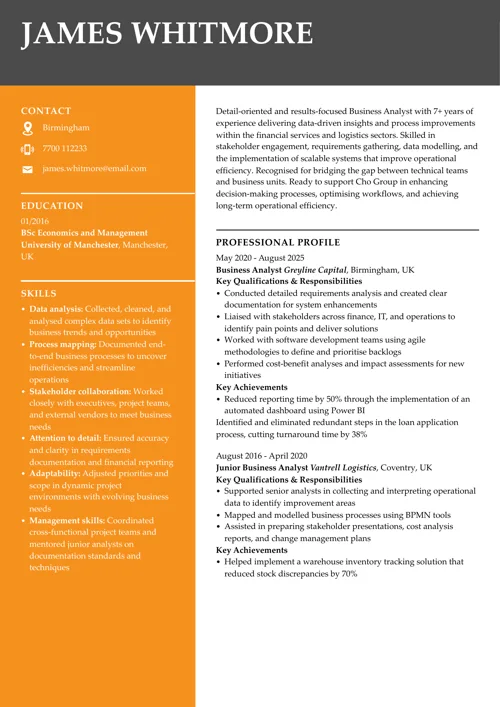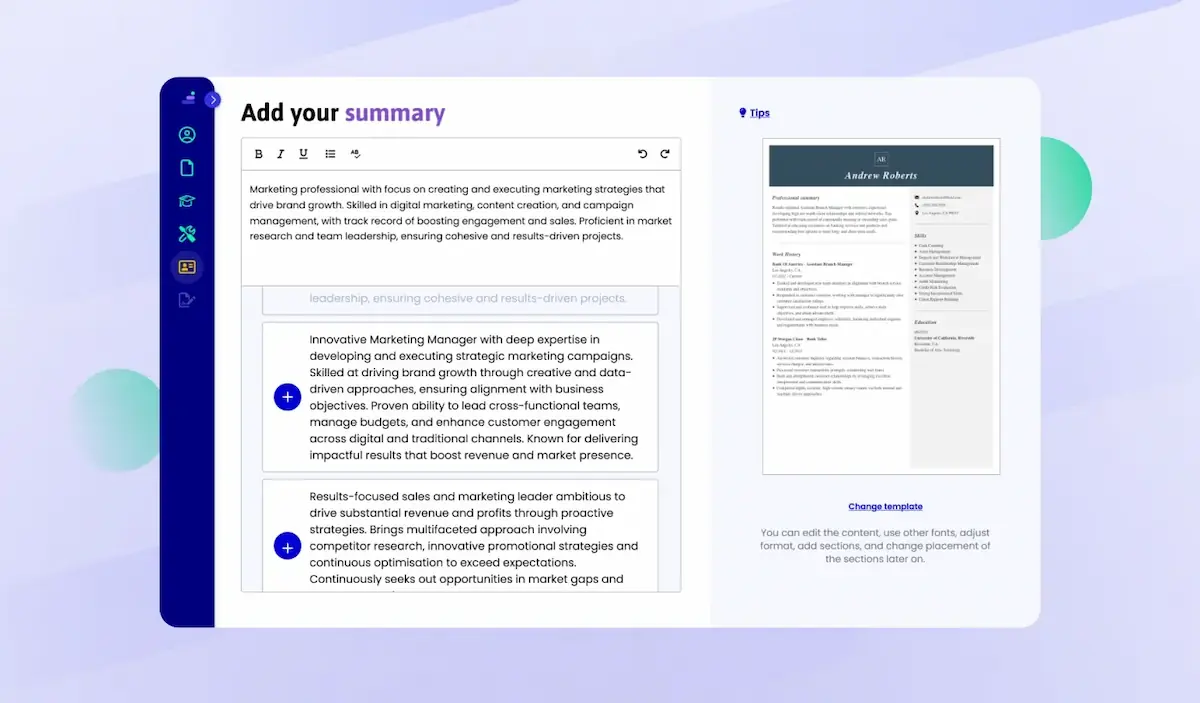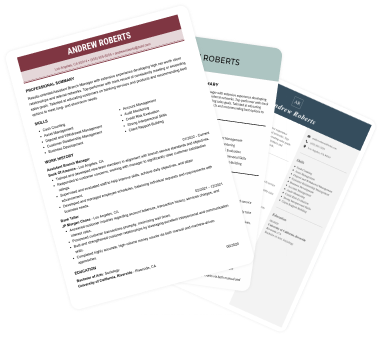Create a professional CV now!
 NO
NO YES
YESLast updated on 29 December, 2025

Our customers have been hired by*:
The UK job market is shifting. After a post-pandemic hiring boom, activity is slowing and competition is rising. Many are asking: What is a cooling job market? It’s when job openings decline, hiring slows, and employers become more selective. While unemployment stays low, landing a role is tougher.
To succeed, you must adapt. I’ll show you how to find a job in a cooling job market, with strategies to stand out and navigate the changing landscape effectively.
Create an effective CV in minutes. Choose a professional CV template and fill in every section of your CV in a flash using ready-made content and expert tips.
Create a professional CV now!
 NO
NO YES
YESWe created the sample on the left using our builder. See other good CV examples like this one.
Looking for other career-related articles? Check these out:
A cooling job market refers to a slowdown in hiring activity. It doesn't necessarily mean mass layoffs or soaring unemployment, but rather that job openings are growing at a slower pace or declining. In the UK, this trend has especially affected sectors like technology and recruitment.
When the labour market cools down, employers tend to become more selective. Some companies pause hiring altogether, while others reduce the number of new roles they offer. It’s a shift from the job seeker’s market of the past few years to one where candidates must work harder to get noticed.
In this environment, it’s not uncommon for job seekers to apply to dozens of roles with little response. Roles that once drew ten applications now receive hundreds. What’s more, expectations around flexible working may no longer be as negotiable, and employers are leaning on automated systems to filter candidates before a human even sees a CV.
In short, a cooling job market means:
But all is not lost. With the right strategy, you can still succeed – and even thrive – during this transition.
Now that you’ve got to know the cooling job market meaning, let’s focus on the best strategies you can implement when you’re trying to get hired while the job market is slowing down:
Traditional job boards are only one piece of the puzzle; in a cooling market, they’re often saturated. I recommend you try networking to improve your chances of landing a new job.
Here’s how you can network your way to success:
Remember, many vacancies are never advertised. This hidden job market is where networking shines.
In a tight market, generic CVs won’t cut it. Instead, tailor your CV and cover letter for each job by:
Don’t forget about your personal brand – ensure your LinkedIn profile is consistent with application materials and clearly communicates your strengths.
Now is not the ideal time to write a CV for a major career change. While a career pivot is possible, candidates with proven experience in a given field tend to have a more potent edge right now.
Instead, lean into your domain expertise. Show employers that you understand their sector’s needs and can contribute immediately. Upskilling in industry-relevant areas (such as AI tools, data literacy, or digital communications) can also set you apart.
A strong CV summary will convince the recruiter you’re the perfect candidate. Save time and choose a ready-made personal statement written by career experts and adjust it to your needs in the LiveCareer CV builder.

Professional headhunters and career coaches have insider knowledge of the market and access to unlisted opportunities. They can help:
Just be selective and work with recruiters who understand your industry and job level.
If you’ve been job hunting since the peak of the “Great Resignation,” it may be time to realign your expectations. Remote roles are more competitive, and employers may not offer the same perks or salaries as they did in 2021.
That doesn’t mean settling for less – it means being flexible. Consider short-term contracts, part-time roles, or interim positions that keep your skills fresh and help you build relationships.
Job searching in a cooling market can be emotionally draining. Rejections or ghosting are, unfortunately, more common in today’s landscape, as 45% of candidates have been ghosted by a recruiter. It’s easy to feel discouraged, but perseverance is crucial.
Here’s how to not get discouraged:
Adopting a structured, patient approach can help you stay motivated over time.
AI is no longer just for tech professionals. From marketing and HR to finance and education, artificial intelligence and automation tools are being integrated across virtually every industry.
Employers are increasingly seeking candidates who are not only comfortable using AI but who can also bring digital agility to their roles. Whether it's prompt engineering with ChatGPT, using AI tools to analyse data, or automating workflows with platforms like Zapier or Notion AI, these skills are becoming core competencies.
The UK job market suffers from a severe digital skills shortage. In fact, a sharp increase in demand for artificial intelligence expertise has led to the UK’s most intense and rapidly accelerating tech skills shortage in over 15 years.
By investing in upskilling – whether through online courses, certifications, or workshops – you boost both your confidence and competitiveness.
Expert advice: Upskilling doesn’t need to be overwhelming. Start with the tools most relevant to your field and focus on building practical proficiency. Free and low-cost platforms to explore include:
In a cooling job market, your LinkedIn profile isn’t just a formality – it’s your personal billboard. Recruiters and hiring managers often search for candidates online before ever posting a role publicly. A strong, optimised LinkedIn profile increases your visibility and improves your chances of being approached for opportunities.
Here’s how to optimise your LinkedIn profile:
A well-maintained LinkedIn profile can turn passive job searching into an inbound opportunity, especially in a market where making yourself discoverable is half the battle.
Many job openings are never publicly advertised. These “hidden” roles are filled through internal referrals, direct outreach, or proactive hiring.
Here’s how to access them:
In a market where advertised roles are flooded with applicants, going direct is often your best route to the front of the queue.
Many candidates treat cover letters as optional, but in a cooling market, they can be a secret weapon, especially since 83% of recruiters say they often or even always read cover letters.
A great cover letter can:
Cold emails and letters of interest go one step further – they’re proactive, tailored, and highly effective when done right. Aim to:
Even if there’s no role open immediately, a well-timed and thoughtful message can create a connection that pays off later.
Despite an overall cooling of the UK labour market, several sectors remain strong, offering opportunities for job seekers who align their skills with long-term growth trends.
Driven by an ageing population and increased mental health needs, this sector continues to hire steadily. Roles like nurses, care workers, and SEN teaching assistants are in high demand, with government backing making this a reliable path for those in health, education, or care-related fields.
E-commerce growth is fuelling demand for warehouse operatives, drivers, and logistics coordinators. With job vacancies up 9% in Q2 2025, this field offers multiple entry points, often without the need for a degree.
The UK needs 250,000+ additional construction workers by 2028. Job seekers with vocational skills, such as electricians, plumbers, or site managers, can find stability and advancement opportunities, as infrastructure and housing projects continue.
With a +24% hiring outlook and 81% of employers struggling to fill roles, engineering offers real opportunities, especially in green energy, tech, and manufacturing. STEM skills and technical upskilling (e.g. CAD, project management) can give candidates a strong edge.
Sustainability roles are on the rise, from Environmental Officers to ESG specialists. As businesses align with net-zero goals, job seekers with an environmental or policy background will find increasing demand in this growing field.
A cooling job market doesn’t mean your career is on hold. It simply requires a shift in approach. By focusing on networking, tailoring your applications, staying flexible, and upskilling strategically, you can remain competitive and even discover opportunities that may not have existed in the hotter market.
Most importantly, remember this: a cooling job market reflects broader economic shifts, not your personal worth. Stay sharp, stay visible, and keep going. Your next opportunity may be closer than you think.
Check these additional career resources for more helpful advice:
You don’t have to be a CV writing expert. In the LiveCareer CV builder you’ll find ready-made content for every industry and position, which you can then add with a single click.

I appreciate you taking the time to read my article on the cooling job market in the UK. If it helped clarify your next steps, I invite you to explore more of our blog for expert tips on job searching, career transitions, CV writing, and thriving in uncertain times.
Our editorial team has reviewed this article for compliance with LiveCareer’s editorial guidelines. It’s to ensure that our expert advice and recommendations are consistent across all our career guides and align with current CV and cover letter writing standards and trends. We’re trusted by over 10 million job seekers, supporting them on their way to finding their dream job. Each article is preceded by research and scrutiny to ensure our content responds to current market trends and demand.
Category: Career Advice
Crafting a job-winning CV is all about showcasing your unique skills and experiences. Start with a strong personal statement that highlights your career goals and achievements.
Try Our CV Builder Now